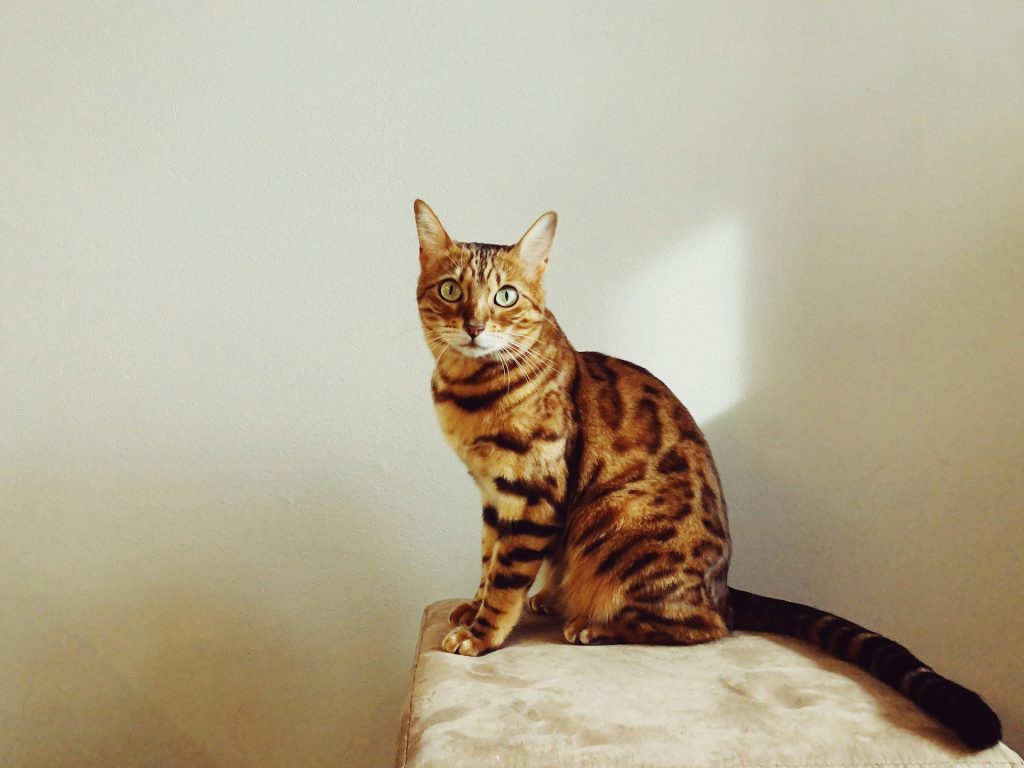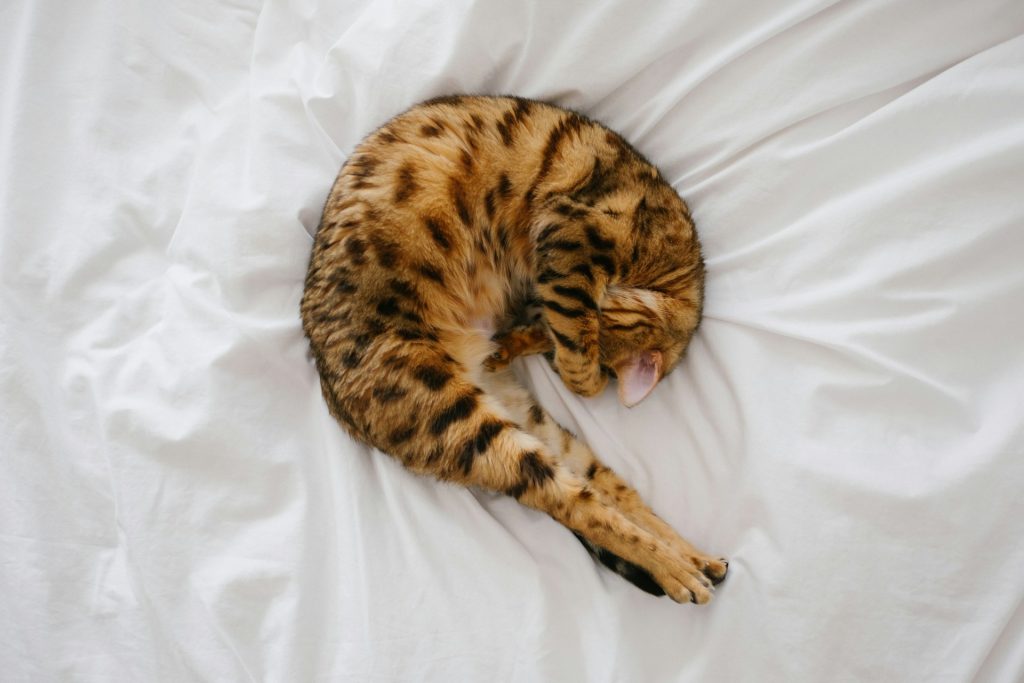Table of Contents
When your cat begins licking your face, it often signifies a display of affection and a deep familial bond. Cats have several ways of showing affection, and face licking is one of their more endearing methods. Some cats may lick to seek attention or as part of their grooming routine, while others might be marking their territory, embedding their scent to claim you as part of their family. These sandpaper kisses can be a cat’s unique way of expressing comfort and connection.
Understanding the reasons behind these behaviors is key to strengthening the bond between you and your feline friend. Whether your cat is marking their territory or simply showing affection, recognizing and responding to these actions can help you communicate better with your furry companion and ensure a harmonious cohabitation.
Unveiling the Mysteries Behind Your Cat’s Licking Habit
Is your cat obsessed with your face? A cat’s tongue is a multifunctional organ, and they use it to explore and interact with the world around them. When your cat licks your face, they are engaging in a behavior that is both exploratory and expressive, a testament to the complex and affectionate nature of our feline friends.
The Complex World of Feline Grooming Rituals
Cats are meticulous groomers, and their grooming rituals are an integral part of their daily routine. These rituals serve not only to keep them clean but also to regulate their body temperature and stimulate circulation. A cat may be licking your face as an extension of these grooming behaviors, a sign that they consider you part of their social group.
Licking as a Form of Social Bonding
If you’ve ever observed multiple cats living together, you may have noticed them grooming each other, a practice known as allogrooming. This behavior is a form of social bonding and is particularly prevalent among cats that have a strong connection. When your cat may be licking your face, they may be including you in this ritual, reinforcing the social bonds and showing trust and care within their ‘family’ unit.
Affection or Attention-Seeking? Understanding Your Cat’s Motives
It’s not uncommon for a cat to lick their human companion’s face as a means of seeking attention. When your cat nudges and licks you, they might be asking for a pet or a play session. This tactile interaction is a way for your feline friend to communicate their needs and desires while also reinforcing your shared bond.
When Your Cat is Displaying Affection Through Licks
The cat’s licking behavior can be multifaceted, with licking your skin sometimes serving as a means of showing love. There are several reasons why your cat may lick you, ranging from the simple pleasure of your taste or texture to the more complex expression of trust and caring. When your cat is licking your skin, they might also be attempting to comfort you, as they would do with their feline kin through grooming.
The Curious Case of Cats and Taste Preferences
Cats possess an organ on the roof of their mouth called the Jacobson’s organ, which allows them to taste-scent the world around them. This heightened sense may drive them towards licking your skin, intrigued by the unique flavors and scents they detect, from the saltiness of your sweat to traces of your last meal.
Salty Skin: An Unexpected Delicacy for Cats
Your skin’s natural saltiness can be an intriguing taste for your cat. While licking your skin may seem like a harmless quirk, it’s important to be aware of any underlying health implications. Excessive licking can sometimes indicate stress or anxiety in cats, and understanding the nuances of this behavior is crucial to ensuring their well-being.
The Intriguing Behavior of Scent-Marking Humans
When your cat is licking your face, they may be engaging in scent-marking behavior. By transferring their scent to you, they are not only claiming you as part of their territory but also creating a comforting environment that smells familiar to them. This behavior is an instinct and part of their way of navigating social hierarchies.
Your Face as a Canvas for Your Cat’s Scent Signature
When your cat licks your face, they might be using it as a canvas to leave their scent signature. This subtle act of marking helps to establish a sense of ownership and familiarity. It’s one of the many ways cats integrate their human companions into their social sphere, creating a shared scent profile that reinforces the bond between them.

Health and Behavior: When Licking Indicates More
While licking is a normal behavior for cats, certain cat breeds may be more inclined to this habit than others. Understanding the specific traits and tendencies of your cat’s breed can provide valuable insights into their licking behavior and help you decipher whether it’s a sign of affection or indicative of a deeper issue.
Stress and Anxiety: Licking as a Coping Mechanism
If your cat is licking you excessively, it could be a sign of stress or anxiety. Cats often resort to repetitive behaviors, like licking, as a way to self-soothe when they’re feeling anxious or stressed. Observing the context and frequency of this behavior can help determine if your cat needs additional support or a change in their environment.
Signs of Stress in Feline Behavior
Excessive grooming or licking can be a telltale sign of stress in cats. Other indicators include changes in appetite, vocalization, and restlessness. Recognizing these signs early on is key to addressing any underlying health concerns and providing your cat with a safe and comfortable living space.
Pica and Other Health Concerns Linked to Licking
Pica is a condition that compels cats to lick non-food items, and it can have both medical and psychological causes. While a cat’s licking behavior may sometimes be harmless, persistent licking of inedible objects could indicate medical issues that require attention. Cat owners need to monitor their pets for any unusual licking behaviors and consult a veterinarian if concerns arise.
When to Worry About Excessive Licking
If your cat loves to lick you, it’s generally considered a sign of affection. However, when the licking becomes excessive or compulsive, it could point to health problems or emotional distress. It’s crucial to observe your cat’s overall behavior and seek veterinary advice if you notice a sudden increase in licking or if it’s accompanied by other concerning symptoms.
Addressing the Face-Licking Phenomenon
Understanding why cats lick human faces leads to better insights into their behavior and how to address it. While showing affection or marking their territory are common reasons, it’s essential to consider the potential risks involved. Strategies to manage or redirect this behavior can help maintain a happy, hygienic relationship with your feline companion.
Is It Safe to Let Your Cat Lick Your Face?
When a cat licks your skin, it’s often a sign of trust and comfort. However, since cats carry bacteria in their mouths, there are potential health implications to consider, especially if you have open wounds or if your cat has access to medical ointments that could be harmful if ingested.
Understanding the Health Implications of Feline Licking
Letting your cat lick your face may seem harmless, but it’s important to be aware of the potential risks. Cat saliva can transmit bacteria and parasites, posing a threat if there’s direct contact with your eyes, nose, or mouth. Additionally, cats that have been in contact with harmful substances or toxic plants pose an increased risk when they lick your skin.
How to Discourage Your Cat from Licking Your Face
To prevent your cat from licking your face, avoid reinforcing the behavior. Instead, encourage your cat to play with cat toys or engage with a cat scratch post, offering distractions that satisfy their instincts without compromising your boundaries.
Alternative Ways to Engage With Your Cat
There are numerous reasons why your cat may lick, but it’s crucial to offer alternatives. Introduce interactive toys, scratching posts, and regular play sessions to satisfy their need for stimulation. These methods not only divert your cat’s licking but also strengthen your bond through positive, shared experiences.
Deeper Insights Into Cat Behavior
Exploring the nuances of cat behavior is key to understanding why your cat might lick your face. By delving into their world, you can appreciate the complexity of their actions and learn to communicate with them in a way that reflects mutual respect and affection.
When Affection Becomes Overzealous: Managing Your Cat’s Licking Habit
If your cat loves you, they may express it through licking, but excessive licking requires management. Understanding the line between affectionate grooming and overzealous behavior helps maintain a comfortable balance in your relationship with your cat.
Introducing New Forms of Play and Affection
When a cat’s licking becomes too intense, introducing new forms of play and affection can help. Engage your cat with interactive games or cuddle sessions that don’t involve licking, thus providing them with attention and love in ways that are enjoyable for both of you.
Cat is Seeking Comfort: Decoding Your Cat’s Emotional Needs
Cats often seek comfort through behaviors like licking. Recognizing when your cat is trying to establish a sense of security can help you address their emotional needs in a way that reduces the urge to lick as a primary source of reassurance.
Providing a Stress-Free Environment for Your Cat
Creating a calm and stable environment is crucial for a cat’s well-being. By ensuring they have a safe space, consistent routines, and plenty of enrichment opportunities, you can help alleviate stress and reduce problematic licking behaviors.

Perfecting Your Relationship With Your Cat
Understanding your cat’s licking behavior is a step towards perfecting your relationship. Whether it’s an expression of love, a greeting, or simply a quirky trait, embracing this aspect of your cat’s personality can enhance the unique bond you share.
The Art of Understanding and Responding to Your Cat’s Affection
When your cat licks your face, it’s an intimate gesture that requires a nuanced response. Recognizing this as a sign of trust and comfort, it is important to respond with gentle strokes or softly spoken words to acknowledge their affection. This reinforces positive behavior and strengthens your bond. However, if you prefer not to be licked, try redirecting your cat’s attention with a toy or a treat without startling or punishing them, as this can damage your relationship.
Encouraging Positive Interactions With Your Feline Friend
Positive interaction with your cat can be encouraged by engaging in activities they enjoy, such as playtime with feather wands or laser pointers. It’s also beneficial to establish a routine that includes regular petting sessions, which can help satisfy your cat’s need for attention and prevent them from using licking as their sole means of interaction. Remember to be consistent with your reactions to their licks, as mixed signals can confuse your cat and affect the way they express their affection.
Cat is Displaying Bonding Behavior: Embracing Your Unique Connection
If your cat licks your face, it may be a throwback to their kittenhood, where such behaviors were associated with the comfort they received from their mother. For cats that were weaned too early or are feeling stressed or anxious, licking can be a self-soothing action. Embrace these moments as signs of a special bond, and provide reassurance through calm, soothing interactions that address their emotional needs and reinforce your unique connection.
Recognizing the Signs of a Strong Human-Cat Bond
A strong human-cat bond is evidenced by more than just frequent licking. Look for signs like your cat following you from room to room, resting on or near you, and showing their belly—a sign of trust. They may also bring you ‘gifts’ such as toys or even small prey, and engage in gentle biting or ‘love nibbles.’ These behaviors indicate that your cat feels secure and content with you, showcasing the depth of your mutual affection.
Embracing the Quirks of Cat Companionship
Cat lovers often delight in the unique behaviors their furry companions exhibit, from their playful antics with cat trees to the way they interact with objects in their environment. Understanding these quirks is essential to appreciating the complexities of your cat’s personality. Licking, a behavior that may seem peculiar at first, is just one of the many signs your cat has imprinted on you, viewing you as a crucial part of their social group.
It’s the certified feline behaviorists who remind us that odd habits, such as face licking, can also be a cat’s way to alleviate their anxiety. By paying close attention to these actions, cat owners can learn to interpret their pet’s needs and emotions, fostering a deeper bond. Embracing these quirks not only enhances the companionship but also ensures that your cat feels secure and loved in its environment, which is vital for its well-being.

Hi, I’m Zoey, a devoted mom to two charming Siamese cats. My passion lies in assisting fellow pet owners in providing optimal care for their cats. On CatsEuphoria, I share practical tips and relatable stories, inviting you to join me in appreciating the authentic bond between humans and our beloved feline companions.




